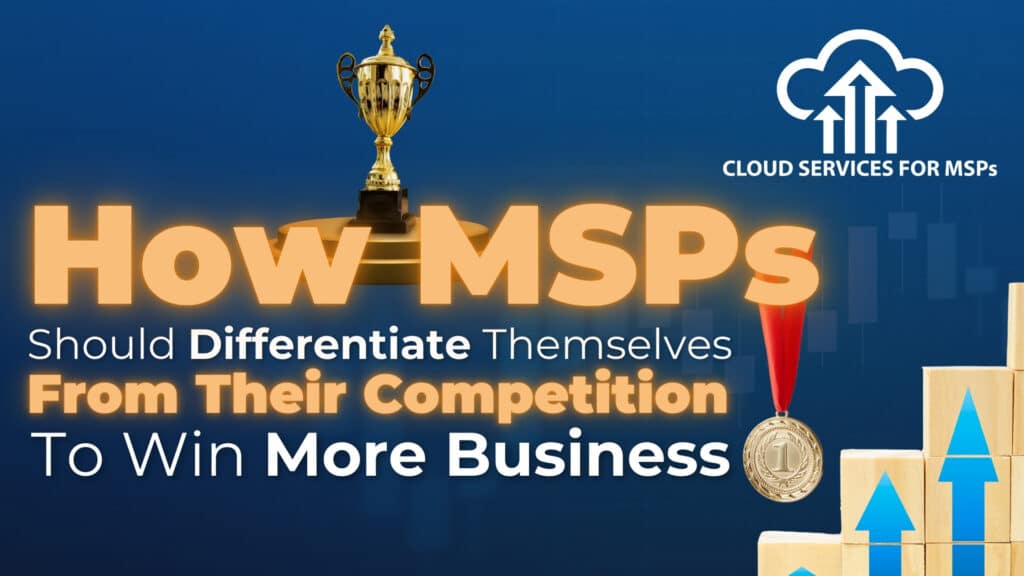How MSPs Should Differentiate Themselves From Their
Competition To Win More Business
Join us for this episode of MSP To The Future where your hosts, Jeanne DeWitt and David Hood, answer these questions and more about these cloud options!
Join us for this episode of MSP To The Future where your hosts, Jeanne DeWitt and David Hood, answer these questions and more about these cloud options!


As you know, the MSP industry is highly competitive. Everyone that thinks they know computers can throw up a website and call themselves an MSP these days: it’s sad, but true!
However, put yourself in your prospect’s shoes. If they need IT services, they will probably google “IT services in X city” and they will find many MSPs with very little differentiation. Who will your prospect choose to call? It’s a roll of the dice.
How can you stand out from the competition?
The Importance of a USP
One of the first things that you should do is develop a unique selling proposition (USP). A USP explains to your prospects and customers why they should buy from you instead of your competitors. It’s a statement about your company which you embody.
An effective USP forms the foundation for pretty much all your marketing, your website, your ads, your podcast, or whatever else is currently in your marketing mix!
A USP can be a few words, or it can be a paragraph. You don’t want to keep it too long, but generally it can be whatever works best to define why your prospects should buy from you instead of your competitors. At its core, a USP is what makes you different, unique, and desirable as an MSP.
Now, what makes a USP work? Most importantly, it must be unique! After all, if other MSPs are using the same USP, it’s not unique.
Another key to a USP is you that you have to back it up. If your USP boasts 99.9% uptime, you need to meet this promise. If your USP is related to cloud, your cloud can’t be down all the time! If your USP talks about a 15 minute response time on critical issues, you better get back to them in 15 minutes, not 20.
If you consistently do what your USP says you do, that’s what’s going to make it work. If you can’t back it, don’t bother having a USP!
Examples of Effective USPs
Here are a few famous non-MSP unique selling proposition examples that took companies from small to nationwide.
- Domino’s Pizza started as a small pizza company in Michigan and developed a USP that guaranteed fresh hot pizza delivered in 30 minutes or less: otherwise, it was free! They backed that USP up and went from a small pizza company in Michigan to a $1 billion company today.
- FedEx started as a small courier service based in Tennessee, and they developed the USP where packages absolutely had to make it to their destination overnight. By meeting this, they grew to one of the largest companies in the world.
From the MSPs we have talked to, a very small percentage have had a USP. Most of the MSPs that had one didn’t back it or track it. If you have a USP and you back it, it can definitely make a difference in your marketing and in your MSP. Why not try it?
How to Create a USP
So, how do you create an effective USP?
A great way to get started is to ask yourself the following question: what critical problems do you solve for your clients? Focus on issues that are urgent and unavoidable,
For example, when we were an MSP, we focused heavily on the cloud. We only worked with customers that were going to go into the cloud. A USP that we used was that our MSP specialized in eliminating costly downtime, ensuring your business runs smoothly with uninterrupted access to critical systems and data.
We understood it. We backed it. Everything that we said we did, and it really helped us to again outshine our competition. Other MSPs would say that they did cloud, but they didn’t embody it. It wasn’t a central part of their MSP: they just said it! Which doesn’t help you.
Another thing you can look at is the specific strengths and weaknesses of your competitors in comparison to your MSP. Make a list:
- What are your strengths?
- What are your competitor’s weaknesses?
- What makes you better than your competitors?
- What are your key differentiators?
- What sets your MSP apart?
- Why do your clients like you?
Let’s elaborate on that last question!
Why Do Your Clients Like Your MSP?
Focus on the outcomes that your clients have had. For example, partnering with your MSP means peace of mind for their business, as you handle all your IT needs with proactive monitoring and cost effective solutions tailored specifically to their unique business needs.
Remember, you have to be able to embody that sentence and back it!
Maybe your clients like that you don’t make them sign long term contracts and you don’t have any hidden fees. This is a great USP: your MSP offers transparent pricing and flexible agreements, ensuring that you clients always know exactly what they’re paying for without being locked into a restrictive contract.
Thinking in this frame of mind will help you to pinpoint exactly what your USP should be.
Time to Get Started Building Your USP!
Overall, a USP is just one piece of the marketing puzzle, but it can certainly make a huge difference to your mindset and the success of your MSP!
Today, I’m going to leave you with this quote from Thomas Edison: “Many of life’s failures are people who did not realize how close they were to success when they gave up.”
Thank you for reading!